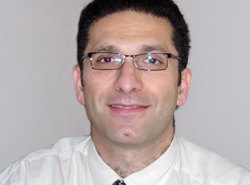 |
Andre Kalil, M.D. |
 |
Junfeng Sun, Ph.D. |
A UNMC research study has determined that using a statistical method that was published nearly 250 years ago could save lives, more efficiently move drugs to market and help physicians predict a patient’s response to medication for severe sepsis.
In the study, UNMC’s Andre Kalil, M.D., and Junfeng Sun, Ph.D., assert that methodology created in 1763 by the Rev. Thomas Bayes — a Presbyterian minister and mathematician — can be used in clinical trials to improve how results are interpreted by combining new data with existing knowledge and expertise.
Bayesian methodology would have investigators look at all the information that is available, including that which comes from trials that failed or yielded negative results.
“The current way to evaluate clinical trials is based on traditional statistics, which does not include unfavorable or negative evidence into their interpretation,” said Dr. Kalil, associate professor of infectious diseases and associate director of the Immunocompromised Host Infectious Diseases Program. “The way clinical trials are now interpreted is like a judge who overlooks previous convictions of a regular criminal during sentencing.”
The results of the UNMC team’s study were published in the May issue of the journal “PLoS One,” a journal published by the Public Library of Science. Click here to see the study.
Dr. Kalil said acceptance of Bayesian methodology in medical sciences has been slow for two major reasons:
- The computational and mathematical difficulties of Bayesian methodology; and
- The meager publication of clinical trials with negative results by major medical journals.
However, progress in modern computer software have made the application of this method much easier, and the current mandatory registration of clinical trials before they are even started have made the publication of negative trials more acceptable and more transparent.
“The time to use Bayesian statistics has arrived for medical sciences, even though it has been successfully applied in the fields of archeology, astronomy, chemistry, engineering, genetics and computational sciences,” he said.
Drs. Kalil and Sun — an assistant professor of biostatistics — reviewed five pivotal clinical trials on the treatment of severe sepsis using the Bayesian method. They wanted to know why clinicians were not rapidly adopting the therapies recommended as new standards of care.
Severe sepsis occurs when an infection spreads throughout the body and begins to affect organ function. Every year, nearly 750,000 people develop severe sepsis in the United States, and up to 40 percent of them die as a consequence of the infection.
The five published clinical trials reviewed were for therapies that addressed a variety of sepsis-related problems such as sugar levels, inflammation, low blood pressure and lung failure.
“These were multicenter trials and the therapies have become standard of care now. But, when you look back, there’s a good amount of negative evidence for several therapies,” Dr. Kalil said. “Results from these new trials are not as favorable when put into context. Physicians should use a grain of salt when looking at the results of brand new trials.
“Our results demonstrate that the strength of evidence (statistical and clinical) is weak for all trials, particularly for the blood pressure and one of the anti-inflammatory trials. It is essential to replicate the results of each of these five clinical trials in confirmatory studies if we want to provide patient care based on scientifically sound evidence.”
|
|
“The clinical guide reflects a more accurate patient response to the five therapies, which will help clinicians determine the best course of action to take,” he said.
In a second study, published in the May issue of the journal, “Intensive Care Medicine,” Drs. Kalil and Sun used the Bayesian method to closely evaluate the need for a confirmatory clinical trial on the controversial anti-inflammatory/anti-thrombotic therapy for severe sepsis called recombinant human activated protein C, or Drotrecogin alfa activated.
The original Drotrecogin alfa activated study showed positive results, after which the Food and Drug Administration narrowly approved its use in a subset of patients with high risk of death, although it was associated with bleeding. The drug also was approved for use in Europe, but now officials there want a confirmatory trial conducted. Positive results have not been replicated in any subsequent trial, Dr. Kalil said.
“Another trial to positively confirm these findings would require 2,000 to 3,000 patients to participate, considering the traditional statistical methodology. We propose that if Bayesian methodology were applied, a trial would only need to enroll about 600 patients with severe sepsis,” Dr. Kalil said. “This would substantially decrease unnecessary patient exposure to an experimental drug or placebo, reduce the amount of time required to complete the study, speed up the approval rate of new drugs, and save up to two-thirds the cost of a clinical trial.”
Dr. Kalil proposed that future trials in all fields of medicine use a blend of traditional and Bayesian statistical methodologies.